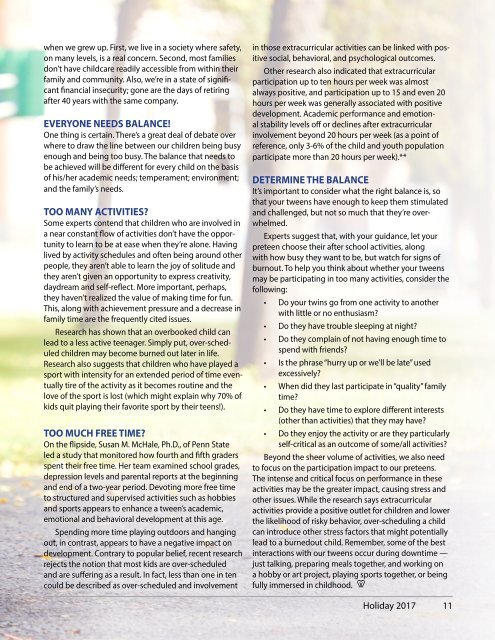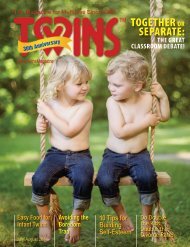2017 HOLIDAY
Create successful ePaper yourself
Turn your PDF publications into a flip-book with our unique Google optimized e-Paper software.
when we grew up. First, we live in a society where safety,<br />
on many levels, is a real concern. Second, most families<br />
don’t have childcare readily accessible from within their<br />
family and community. Also, we’re in a state of significant<br />
financial insecurity; gone are the days of retiring<br />
after 40 years with the same company.<br />
EVERYONE NEEDS BALANCE!<br />
One thing is certain. There’s a great deal of debate over<br />
where to draw the line between our children being busy<br />
enough and being too busy. The balance that needs to<br />
be achieved will be different for every child on the basis<br />
of his/her academic needs; temperament; environment;<br />
and the family’s needs.<br />
TOO MANY ACTIVITIES?<br />
Some experts contend that children who are involved in<br />
a near constant flow of activities don’t have the opportunity<br />
to learn to be at ease when they’re alone. Having<br />
lived by activity schedules and often being around other<br />
people, they aren’t able to learn the joy of solitude and<br />
they aren’t given an opportunity to express creativity,<br />
daydream and self-reflect. More important, perhaps,<br />
they haven’t realized the value of making time for fun.<br />
This, along with achievement pressure and a decrease in<br />
family time are the frequently cited issues.<br />
Research has shown that an overbooked child can<br />
lead to a less active teenager. Simply put, over-scheduled<br />
children may become burned out later in life.<br />
Research also suggests that children who have played a<br />
sport with intensity for an extended period of time eventually<br />
tire of the activity as it becomes routine and the<br />
love of the sport is lost (which might explain why 70% of<br />
kids quit playing their favorite sport by their teens!).<br />
TOO MUCH FREE TIME?<br />
On the flipside, Susan M. McHale, Ph.D., of Penn State<br />
led a study that monitored how fourth and fifth graders<br />
spent their free time. Her team examined school grades,<br />
depression levels and parental reports at the beginning<br />
and end of a two-year period. Devoting more free time<br />
to structured and supervised activities such as hobbies<br />
and sports appears to enhance a tween’s academic,<br />
emotional and behavioral development at this age.<br />
Spending more time playing outdoors and hanging<br />
out, in contrast, appears to have a negative impact on<br />
development. Contrary to popular belief, recent research<br />
rejects the notion that most kids are over-scheduled<br />
and are suffering as a result. In fact, less than one in ten<br />
could be described as over-scheduled and involvement<br />
in those extracurricular activities can be linked with positive<br />
social, behavioral, and psychological outcomes.<br />
Other research also indicated that extracurricular<br />
participation up to ten hours per week was almost<br />
always positive, and participation up to 15 and even 20<br />
hours per week was generally associated with positive<br />
development. Academic performance and emotional<br />
stability levels off or declines after extracurricular<br />
involvement beyond 20 hours per week (as a point of<br />
reference, only 3-6% of the child and youth population<br />
participate more than 20 hours per week).**<br />
DETERMINE THE BALANCE<br />
It’s important to consider what the right balance is, so<br />
that your tweens have enough to keep them stimulated<br />
and challenged, but not so much that they’re overwhelmed.<br />
Experts suggest that, with your guidance, let your<br />
preteen choose their after school activities, along<br />
with how busy they want to be, but watch for signs of<br />
burnout. To help you think about whether your tweens<br />
may be participating in too many activities, consider the<br />
following:<br />
• Do your twins go from one activity to another<br />
with little or no enthusiasm?<br />
• Do they have trouble sleeping at night?<br />
• Do they complain of not having enough time to<br />
spend with friends?<br />
• Is the phrase “hurry up or we’ll be late” used<br />
excessively?<br />
• When did they last participate in “quality” family<br />
time?<br />
• Do they have time to explore different interests<br />
(other than activities) that they may have?<br />
• Do they enjoy the activity or are they particularly<br />
self-critical as an outcome of some/all activities?<br />
Beyond the sheer volume of activities, we also need<br />
to focus on the participation impact to our preteens.<br />
The intense and critical focus on performance in these<br />
activities may be the greater impact, causing stress and<br />
other issues. While the research says extracurricular<br />
activities provide a positive outlet for children and lower<br />
the likelihood of risky behavior, over-scheduling a child<br />
can introduce other stress factors that might potentially<br />
lead to a burnedout child. Remember, some of the best<br />
interactions with our tweens occur during downtime —<br />
just talking, preparing meals together, and working on<br />
a hobby or art project, playing sports together, or being<br />
fully immersed in childhood. A<br />
Holiday <strong>2017</strong> 11

















